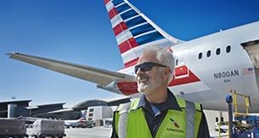
American Airlines Cargo underwent a major modernization upgrade with the recent roll-out of a new cargo end-to-end management system in cooperation with IT solutions provider, IBS Software.
The transition to the new system, which started October 1, replaces the majority of the organization’s legacy technology, narrowing 90 systems down to less than 10.
American Airlines Cargo said not only is the upgrade about bringing in new tools and enhancing customer experience, it is also part of its broader initiative to modernize the entire business, the freighter said in a statement.
The new system is powered by the iCargo platform and implemented in partnership with IBS Software. The platform has a host of modern technology components, driving transformation in sales, operations, customer experience, and accounting, allowing for more efficient online channels, better tracking, greater efficiency in warehouses, and a robust back-end system that will further strengthen both the customer and team member experience.
The transition to iCargo provides the foundation for a host of innovations and initiatives expected to be rolled out in in the next 12 months and beyond, it added.
"The technology transition impacts more than 8,000 team members in cargo and airport operations, and more than 30,000 customers," American Airlines Cargo said.
"A team of more than 700 people across 300 locations globally and more than 150 business, technology, and vendor partners at the airline’s new headquarters in Ft. Worth, TX supported the implementation process," it added.
Jessica Tyler, vice president strategy and development for American Airlines Cargo, has led the technology initiative since its genesis nearly three years ago.
“As our team continues to evolve through digital enhancements and investments in technology, we want to lead the effort to challenge and change the way players in the industry interact and collaborate,” Tyler said.
American Airlines Cargo provides one of the largest cargo networks in the world with cargo terminals and interline connections across the globe. It transports cargo between major cities in the United States, Europe, Canada, Mexico, the Caribbean, Latin America and Asia.



